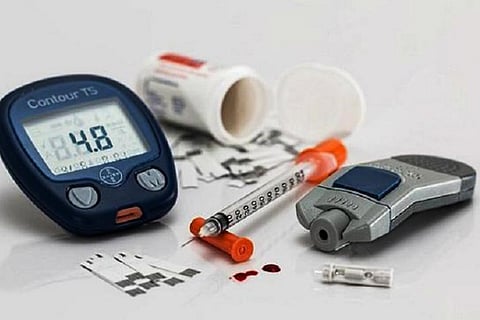

The Kerala High Court has issued notice to both the Union Government and the state seeking response on a Public Interest Litigation (PIL) to consider the Type 1 Diabetes in the disability list under the Rights of Person with Disabilities (RPWD) Act 2016.
The PIL was filed by Shihabudheen, a parent of a child who has Type 1 diabetes.
Shihabudheen, who lives in Thiruvananthapuram, is also the Vice President of the Type 1 Diabetes Welfare Society.
The PIL also sought directions to implement other welfare measures.
The petition sought to take appropriate steps including issuance of a notification to include Type 1 Diabetes Mellitus (T1DM) generally called Juvenile Diabetes as a disability under the Rights of Persons with Disabilities Act 2016 for all practical purposes.
The petitioner’s five year old son was diagnosed with Type 1 diabetes Mellitus at the age of two and half years.
“Type 1 Diabetes is a serious permanent medical condition, in which, due to the pancreatic failure, the body fails to produce insulin or produce very little insulin. Because of the non production of insulin, the glucose doesn’t move into the cells and instead gets built up in the blood, which is generally referred to as ‘hyperglycemia’ or high sugar level. Hence, patients with such insulin deficiency are dependent upon external sources of insulin through injections throughout their life on a daily basis and the said use of external sources of insulin, often results in another medical condition, referred to as ‘hypoglycemia’ in which the blood sugar levels are too low,” says the petition.
Elaborating further, it adds, “If the amount of insulin injected doesn’t match the exact amount of body needs, the children could end up with too much insulin in their system which leads to low blood sugar. Because of the pancreatic failure, the pancreas cannot “shut off” the insulin production very quickly, which results in the lower sugar levels,” the petition submits.
Hypoglycemia-a usual side effect of treatment with blood sugar lowering medications like insulin injections and generally happens in the event of any unplanned physical activity or eating meals later than usuals etc.
“In children with Type 1 diabetes, the sugar levels in the blood are not managed on its own and the sugar levels could be highly fluctuating depending upon various factors like the diet, physical activity, human mood etc. Children suffering from Type 1 diabetic need continuous monitoring of their sugar level round the clock and they literally live on insulin injections and it is an incurable medical condition. They also need to carry glucometer and insulin pens with them.” the petition further says.
“In the absence of timely intervention, the children can collapse and especially when they are anxious or tense, the sugar levels can fluctuate in an alarming proportion. In many cases, when the sugar level builds up in the blood, the patient feels to urinate very often and also gets dehydrated. It’s a chronic and potentially life-threatening condition characterized by the body losing its ability to produce insulin. It is a complex, expensive and exhausting disorder for the child and the parent ,and an ongoing uninterrupted care is required to be provided to such children and adolescents,” it says.
“The pain and suffering of children with Type 1 diabetes and their parents are extremely sympathetic and they have to be on vigil 24 hours taking note of the kind and quantity of the diet which needs to be given based on the reading of the glucose level, the activities of the child, their mood fluctuation etc,” the petition submits.